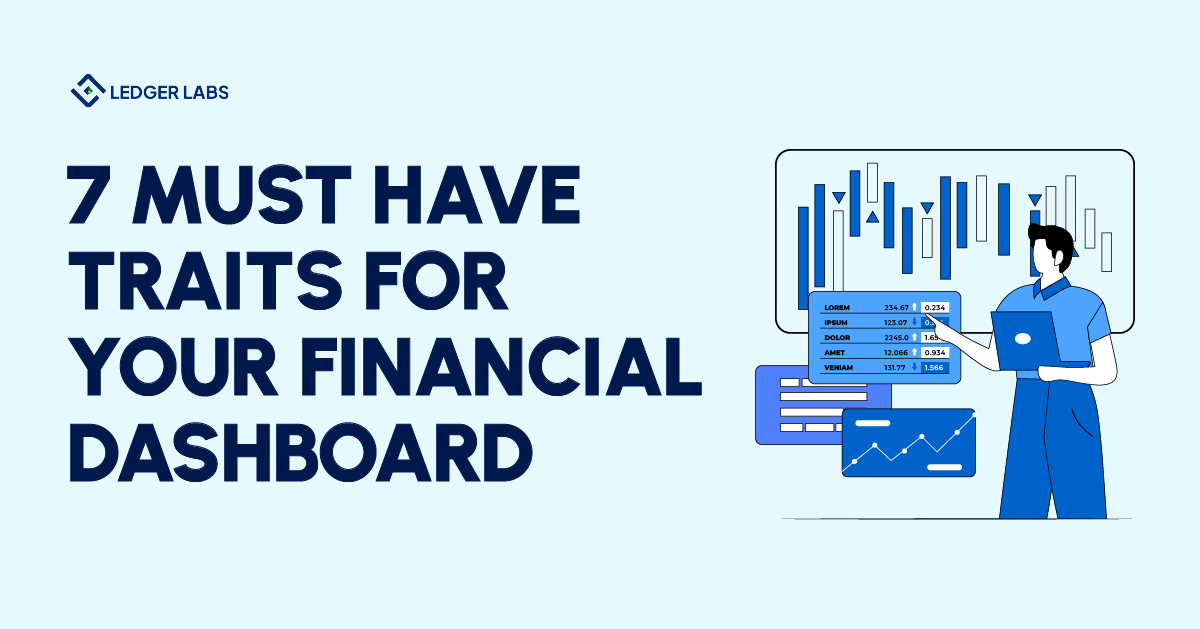Businesses often wonder what is a financial dashboard or accounting dashboard. And what different traits it should have for smooth functioning. Well, with the help of this article, we will answer all of these queries for you.
The dashboard is a very important part. Whether it is your vehicle or a financial system, in both cases, this dashboard tells you how well the machinery is working and the problems faced during, before, or after the drive. When a driver is on the way, he occasionally takes a look at the dashboard. Every now and then, just to ensure that the machinery is working flawlessly.
This is something that even a business should do with the financial dashboard.
When you are running a business, you should keep an eye on the financial or accounting dashboard. To know the real-time status of your financial machinery. But that’s not all that this dashboard does. You as a business may often get confused about the real use to benefit of a dashboard or even its definition. With the help of the coming sections of this write-up. We will have a look at the different aspects related to this finance dashboard and its must-haves.
But, before proceeding to the same, let’s know about what a financial dashboard is.
What is a Financial Dashboard?
A financial dashboard is a system or tool for a business that uses pre-defined intelligence factors to help the business in determining the financial KPIs. This includes the entire process of tracking and reporting the KPIs and much more. The modern accounting dashboard can also provide deeper business insight to the management. And allow them to reduce different costs to increase profitability.
Basic and Must-Have Features of Any Viable Financial Dashboard
Any financial dashboard must be capable of showing the KPIs and presenting other data to you. Let’s have a look at the must-have features of any dashboard that are quite important for any business.
1. Trustworthy:
While it may appear logical that a dashboard must be built on trustworthy data. Our research has shown that the majority of small company owners no longer have faith in the integrity of the reporting. Your accounting procedure should create the data for your dashboard using established, documented processes and stringent internal controls. For this, the basis for solid, well-informed judgments is precise underlying facts.
2. Customized:
Your financial dashboard shouldn’t be generic since your company isn’t. Its key performance indicators should be tailored to your business, taking into account your sector, stage of development, and both short-term and long-term objectives. The most important considerations about selections should be addressed. Whether it means making sure you have enough money to pay for your next employment or new tech investment.
3. Data Based:
Every statistic on your financial dashboard needs to be based on tangible information that you are keeping track of. When concerns call for a deeper look in particular areas, your dashboard must be complemented with thorough financial data that is easily accessible. If your uninvested cash is expected to decrease in 2 weeks, for instance, you must be able to identify the precise assumptions related to the outflow and inflow that were used to make that estimate.
4. Derived from Acts:
Key performance data are visible on a reliable and advanced financial dashboard, which raises concerns. These queries need to prompt firm action in response. You can only learn about issues and potential in your company through these inquiries. Quick response is essential in both situations, which is why dashboard data must be easily understood.
5. Well-Planned and Scheduled:
Your organization is flexible and exposed to continual risks and possibilities, much like your automobile might overheat after three hours in traffic during summer. To guarantee you can respond to bad patterns before they have a chance to cause harm, your financial dashboard should be produced at least once each month. To make the most of your possibilities, you need to act quickly. For instance, if your accounting dashboard tracks revenue patterns per service offering, you need to stop worrying about the sales and focus on the after and before-sale services for the time being as required.
6. Graphic and Self-Explanatory:
A financial dashboard’s main purpose is to quickly and easily display the metrics that are most significant to you. Its goal is to support swift, effective, and well-informed judgments. To do this, the information should be delivered in a way that appeals to you or the management and is tailored to the manner in which the business prefers to consume it. For this, you may need to take the help of some graphs or charts, generated by the dashboard, for active and better presentation. This is because a well-designed dashboard makes it easy for you to quickly get the information you require and the management doesn’t need to examine it. For this, you need to explore some financial dashboard samples and use the desired pattern as required.
7. Futuristic and Advanced:
Your business is fluid, and even the market is always changing. To make sure the KPIs are still relevant, you need to adjust your accounting dashboard. To stay multiple steps ahead of your demands, ensure that your team adjusts to your reports and responds accordingly.
Summing Up
So, with the help of the above sections, it must be clear by now, what your financial dashboard must be able to do and present. It’s not much to ask from the system. With the help of a simple yet effective and reliable dashboard, you can ensure that your business and its finances run smoothly whilst ensuring cost-minimization and profit maximization.
If you want to get your Financial Dashboard right, connect with the smart financial professionals at The Ledger Labs. They will allow and help you to bring together a healthy and reliable dashboard that you can use for further assistance. Connect with us today.












